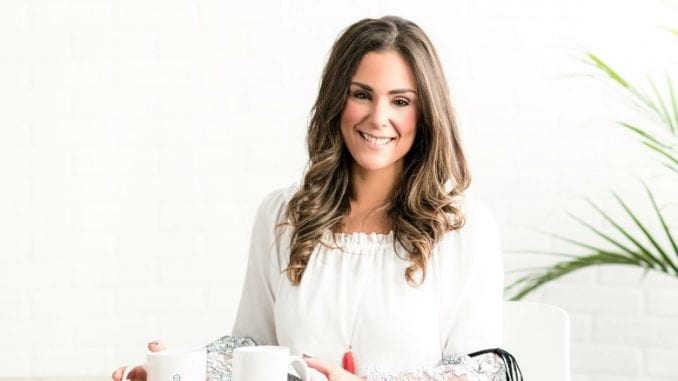
Alyza Bohbot was brought up in coffee—her parents started Alakef Coffee Roasters in Duluth, Minn. Now she has started a brand called City Girl Coffee, sourcing exclusively from female producers.
BY ASHLEY RODRIGUEZ
BARISTA MAGAZINE ONLINE
Photos courtesy of City Girl Coffee
Alyza Bohbot comes from a coffee family. Her parents started Alakef Coffee Roasters when she was still a kid, and she imagined a hundred different careers for herself before deciding to take over her family’s business. Along with running Alakef, she has launched a brand called City Girl Coffee to highlight gender inequity at origin, and sources coffees only from female producers.
Ashley Rodriguez: How did you get into coffee? What was your first coffee job?
Alyza Bohbot: I come from a coffee family. I was only 5 when my parents started Alakef Coffee Roasters, so some of my earliest memories of coffee are sitting at our dining room table putting labels on bags. I remember my dad saying, “No bubbles Alyza, you want the bags to look really nice!” I also have fond memories of traveling with my parents to customers to do demos, or trade shows, where I would either help them pass out coffee, or sit in the back kitchens with my paint-by-number projects. When I was only 8, we took a trip to Costa Rica, and I remember being completely blown away by the magnitude of the coffee farms, and the tremendous amount of work and love that went into curating the perfect coffee bean.
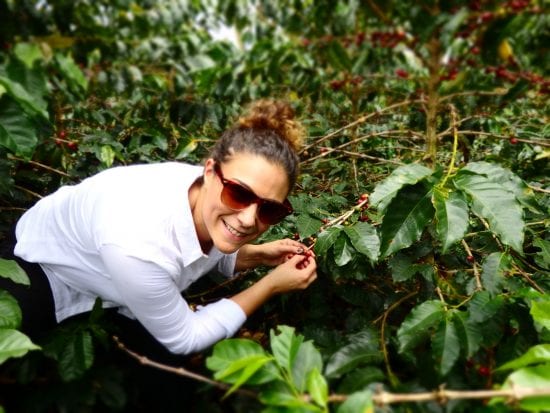
AR: Did you ever think you’d work in coffee growing up?
AB: At one point in my life I wanted to be a singer/songwriter, but when a vocal nodules diagnosis in high school made that unfeasible for me, I found myself searching for other areas of interest. I knew I had an interest in fashion and retail, so that led me to a degree in retail management. Upon graduation, I took a job with the Boston Beer Company, doing outside sales in and around the Boston area. After a couple years, and some soul searching, I found myself wanting to leave that job and found myself in a School Counseling graduate program.
I had every intention of becoming a high school guidance counselor when my parents approached me to tell me they were going to sell the business. At that time, I remember feeling so strongly that I did not want to see the company leave our family, so I proposed a trial period with the company to see if I had the passion and drive to not only take over the business, but to grow it, and turn it into something new. I quickly realized within that trial period that not only did I have the aptitude for business, but I had an immense amount of passion for coffee and the coffee industry.
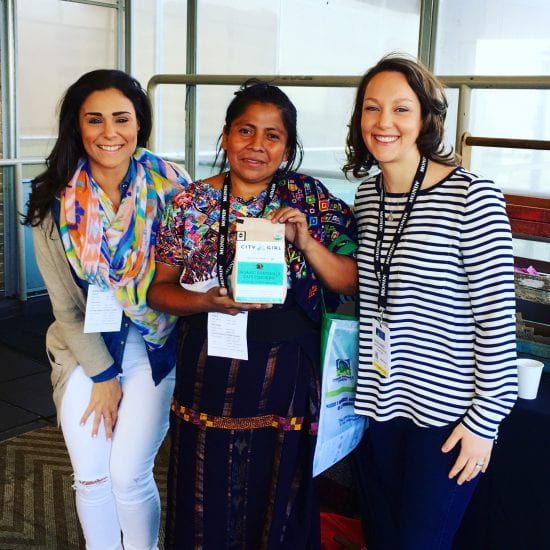
AR: What experiences or ideas helped you develop the City Girl brand? How did you differentiate it from the brand your parents built?
AB: I had just come back into the business and was invited to attend the International Women’s Coffee Alliance annual breakfast at SCA. That year, they were gearing up for the biannual conference that would be held in Colombia. A gentleman came onstage and told a story about a husband and wife who owned a coffee farm in Colombia. Since Colombia has been such a war-torn country, the husband had to go and fight, and was unfortunately killed. The wife took ownership of the farm, and when a key piece of their machinery broke down, she went to the banks in Colombia and asked for a loan but was turned down simply for being a woman.
I remember sitting in the audience thinking how unjust this was, and how unaware I was of this inequity, even though I had basically spent my whole life in and around the coffee industry. It was there and then that I set out on a mission to create a brand that sourced exclusively from women-owned and -managed farms and cooperatives. More importantly, I wanted to create a business model that would allow us to give a portion of our sales directly back to organizations like the IWCA and Café Femenino, in order to ensure that these women would truly gain access to fair market distribution, financing, education, and resources.
AR: What makes your business unique?
AB: I think one of the things that makes our business so unique is how rooted in our mission we are. Obviously, the City Girl brand has its own differentiators being rooted so deeply in women empowerment and equity, but our Alakef brand and company are also deeply rooted in the community. We recently embarked on a rebranding effort with Alakef, and with that we will be launching a new program calls “Alakef Gives.” For the majority of our company history, we have made it a priority to work with and give back to local organizations and charities, not because we wanted the publicity, but because we truly felt it was the right thing to do.
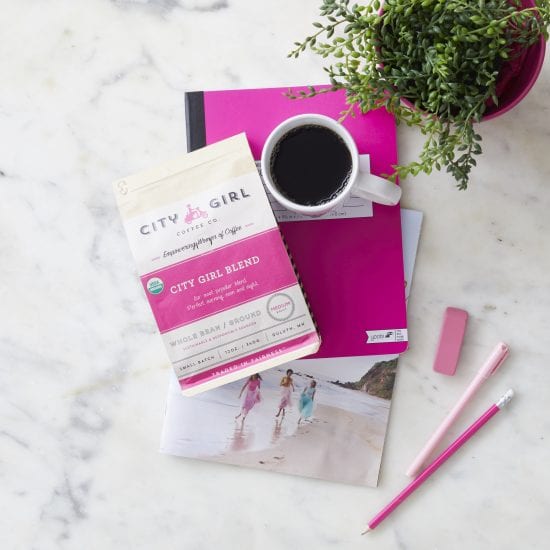
With the new program, we will now have the opportunity to expand upon this notion and involve our customers and community partners to tell us what and where they would like to see us donate our time and resources. Our vision for the program is that, on an annual base, we will ask our customers and community partners to nominate local charities and nonprofits that we will donate a portion of our sales to. In an industry that has seen tremendous growth and saturation over the last 25-30 years, I feel proud that our company continues to not only stand the test of time, but continues to provide excellent coffee, customer service, and investments back in our local communities.
AR: I’m interested in your branding and how you think about gender in coffee. Can you speak a little more about how you came up with your aesthetic vision and how it translates to your mission?
AB: As I mentioned the “ah-ha” moment earlier, as I began conceptualizing the brand, I wanted to create something that felt unapologetically feminine. We worked with a brand consultant out of California, and I told her I wanted to create something that was “’50s glam meets modern Bad A**,” and she came back with the concept of the girl on the scooter. I immediately knew it was a symbol of what the brand could become. For me, and for our company, it was important to create a brand that was both rooted in mission, but that was also fun, energetic, and unique.
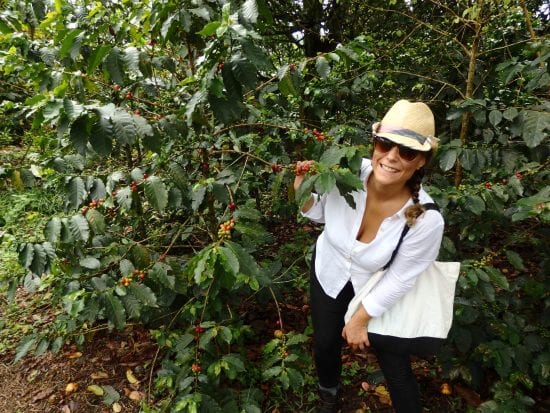
AR: What feels important to you in coffee? What would you like for our community to work on?
AB: I think right now, the most important thing to me in coffee is true sustainability. We pride ourselves on being a sustainable coffee company, both in how we source and how we treat our environment. In fact, we were even awarded a sustainability award by the Minneapolis Business Journal last year. Though, to us right now, the true key to sustainability in coffee is focusing on and empowering women in coffee. There has been a tremendous amount of research that shows the benefits of including women, in these countries of origin, in conversations around household finances. Additionally, ensuring women have access to education, resources, and are put in a position of power has incredible impacts on both family units and the surrounding communities.
AR: Have you every received a compliment or criticism that surprised you or made you reconsider the way you operate?
AB: When we first started getting national attention for our City Girl brand and mission, some people responded negatively that they felt we were alienating men. This just simply isn’t the case. We have absolutely nothing against men or male producers. Our belief is simply that men already have fair access to the marketplace and resources. Our only hope with our brand is that we can create a conversation around the gender inequity that women producers still face in the countries of origin where coffee is sourced, and move the conversation to spark real and lasting changes.
AR: What’s next for you?
AB: The next move for us as a company is to continue to build on the momentum that City Girl has gained over the last several years, to gain more market share and increase our opportunity to spread awareness for the women farmers and producers we work with. For me personally? I am hoping work slows down a bit in the next few years, so I can have more time to get back to music and theater!


